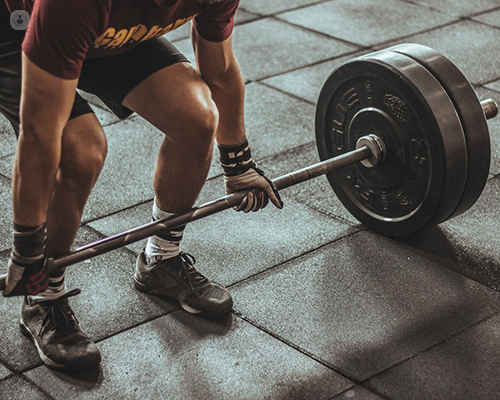Shoulder pain and weightlifting: how to avoid it
Written by:If your New Year’s resolution is to get fit and you’re about to join a gym, it’s important to know that many gym-goers manage to either sustain injuries to their shoulder or experience shoulder pain that limits their exercise. This is usually due to a number of reasons, including poor technique used during weightlifting. Orthopaedic surgeon Mr Nick Ferran sees several patients at his clinic with injuries or pain related to gym activity. Here he explains the commonest gym-related shoulder injuries and how to stay shoulder-safe when it comes to lifting.

What causes gym-related shoulder injuries?
The four factors that can lead to shoulder pain or injuries in the gym from weightlifting are:
- excessive loading
- repetitive loading
- poor technique
- performance enhancers (steroids)
There is no doubt that overloading a tendon beyond its structural capability will cause it to rupture. But overloading isn’t just about weight, the direction in which the load is applied, and the rate at which it is applied can also cause tendons to fail. Degenerate tendons are weaker than healthy ones and as we age, our tendons degenerate, so we need to be cautious how we load our tendons as we age. Repetitive loading can also cause problems for shoulders. Too many repetitions and not enough recovery time can lead to inflammation of the subacromial bursa or flare-up of tendinopathy of the rotator cuff tendons or long head of biceps tendon resulting in pain during or after exercise.
Poor technique can cause similar problems by loading our tendons in unfavourable directions or positions which can also lead to inflammation and pain. Steroids and other performance enhancers are known to weaken healthy tendons leading to ruptures, so it is always advised to avoid these.
What are some of the common shoulder injuries from lifting?
The most common shoulder injuries to occur from going to the gym can vary from:
- rotator cuff injuries – the muscles and tendons around the shoulder joint may become inflamed.
- rupture of the pectoralis major tendon.
- injuries to the long head of the biceps or the labrum – the cartilage rim surrounding the shoulder socket to keep the ball of the joint in place.
- shoulder dislocations – which may occur in severe cases due to the loss of control of extreme weights.
How can I avoid shoulder pain when lifting?
The best way to avoid gym-related injuries is to have a sensible routine that increases weight in a safe and realistic manner. The technique is also important, and we can often fall into bad habits and postures that need correcting. I recommend consulting a personal trainer or strength and conditioning coach to develop a safe and realistic plan to meet your goals. Most good gyms offer introductory plans for free. Getting a personal trainer or strength and conditioning coach to show you how to perform exercises especially weight lifting correctly and safely is key, but I would get them to review you from time to time to ensure you aren’t developing bad habits or posture.
Finally stay away from steroids and performance enhancers if you want to stay away from the surgeon’s blade!


